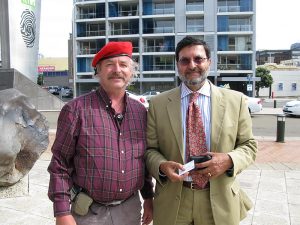 Image by Cle0patra via Flickr
Image by Cle0patra via Flickr
Press Release: MildGreens
Potty Ideas Drives Jobs Summit into Ecstasy!
The appearance of the NORML “CANNABUS” on the Television Three evening news at the Jobs Summit created a lighthearted segway to the ‘bad news’ from the Reserve Bank Governor – however despite a great camera shot, the bus’s presence or purpose at the event was not explored any further.
Legal regulation of Cannabis would not only have an impact in the New Zealand economy, globally, it would bring back in to legal circulation about a trillion dollars that can be invested back into the community and towards trade. Such creative thinking is particularly targeted at EU and western economies who seem to need any and all leverage options and ideas to shorten and flatten this recession. The United States largest state economy, California, is considering legal regulation of cannabis very seriously.
The UN Office of Drug Control is hosting a discussion this March on all drug prohibitions and how effective they deliver health to people. New Zealand is sending Associate Health Minister, Hon Peter Dunne. He has already declared he is not at all receptive to cannabis legalisation…. no matter how far he is prepared to throw the country down the toot, he is emphatically opposed. So why send him, keep him at home and bank the money.
It has been often quoted elsewhere, but I repeat here for its timeliness and relevance to the NZ job summit, “times of regulated recreational substances and no money are easier than all the money in the world and unregulated and bottomless prohibition into which it is poured.”
D-classification of cannabis will reinstate social cohesion and resiliency while balancing the books from both sides.
Message to Prime Minister Rt Hon. John Key, call Jeffrey Miron!
Jeffrey Miron, Director of Undergraduate Studies, Address: Littauer Center M-28. E-Mail: miron@fas.harvard.edu. Tel: 617-495-4129
www.economics.harvard.edu/faculty/miron
Costs of Marijuana Prohibition: Economic Analysis
Dr. Jeffrey Miron, visiting professor of economics at Harvard University. … Dr. Miron’s paper, “The Budgetary Implications of Marijuana Prohibition,” see www.prohibitioncosts.org/
Social Ecologist ‘at large’
http://mildgreens.blogspot.com/
http://blairformayor.blogspot.com/
http://blair4mayor.com/
http://efsdp.org/
ph (643) 389 4065 cell 027 265 7219
Related articles by Zemanta
- National Geographic Special: Marijuana Nation (stillisstillmoving.com)
- What should the next President do about Pot? (stillisstillmoving.com)
- Growing Up in the Age of Legal Marijuana (mildgreens.blogspot.com)
- Cannabis key difference between Helen and John (mildgreens.blogspot.com)
- Legalizing Marijuana Tops Obama Online Poll (middletownmike.blogspot.com)












